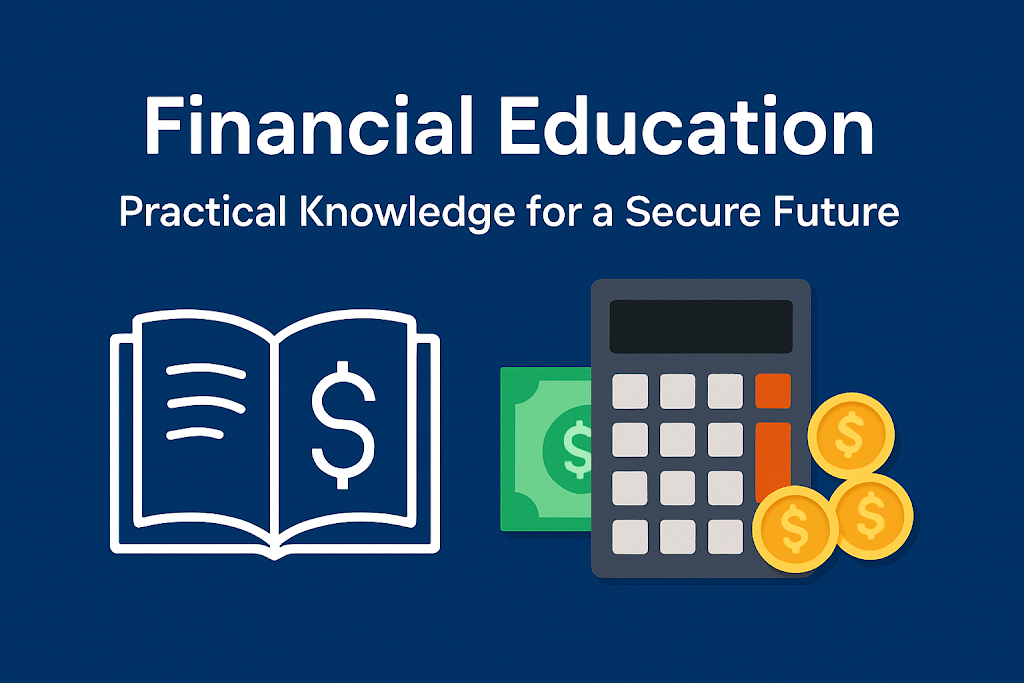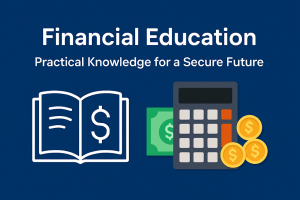In a world where financial decisions shape our lives daily, Financial Education has become more than just a helpful skill—it’s a necessity. Whether you’re saving for your first car, planning retirement, or simply trying to stop living paycheck to paycheck, understanding money is the foundation. And yet, many of us were never taught how to manage finances effectively. In this comprehensive guide, we’ll explore practical, actionable tips that will help you build a more secure financial future through real-world knowledge.
Why Financial Education Matters More Than Ever
Financial literacy is no longer optional. With the rise of digital banking, online investing, and a complex web of consumer choices, being financially savvy protects you from scams, unnecessary debt, and poor spending habits. Financial Education equips you with the tools to navigate the economic landscape confidently and responsibly.
From understanding interest rates and budgeting basics to managing credit and building wealth, financial education arms you with insights that can dramatically affect your quality of life. According to a report by the FINRA Foundation, individuals with higher financial literacy are more likely to save regularly, invest wisely, and avoid high-interest debt traps.
Mastering the Basics of Personal Finance
Before you dive into investing or real estate, it’s essential to build a solid foundation in personal finance. This includes:
- Budgeting: Know where your money goes each month. Use tools like Mint or YNAB (You Need a Budget) to track spending.
- Emergency Funds: Save 3–6 months’ worth of expenses in a high-yield savings account to cover unexpected events.
- Debt Management: Prioritize paying off high-interest debt like credit cards before student or auto loans.
- Spending Habits: Learn to distinguish between needs and wants. Practice mindful spending.
Understanding these basics is the first step in any effective Financial Education strategy. Without them, building wealth is like building a house on sand.
Smart Budgeting Strategies You Can Start Today
One of the most critical aspects of financial education is developing an effective budget. A budget isn’t a restriction—it’s a roadmap. Here’s how to craft one that works for you:
- Use the 50/30/20 Rule: Allocate 50% of your income to needs, 30% to wants, and 20% to savings or debt repayment.
- Automate Your Savings: Set up automatic transfers to your savings account right after payday.
- Track Expenses Weekly: Review your spending every week to stay on top of your goals.
- Cut Invisible Costs: Cancel unused subscriptions or renegotiate bills like your internet plan.
Budgeting is not a one-time activity. It’s a continuous process that evolves with your income and goals. Make it part of your financial education routine.
Understanding Credit and How to Use It Wisely
Your credit score can determine whether you qualify for a loan, your interest rate, and even affect job opportunities. Here’s what everyone should know:
- Check Your Credit Report Annually: Use AnnualCreditReport.com to access free reports from all three major credit bureaus.
- Keep Utilization Below 30%: If you have a $10,000 limit, try not to borrow more than $3,000.
- Pay On Time, Every Time: Your payment history is the single most important factor in your credit score.
- Don’t Close Old Accounts: The longer your credit history, the better.
Understanding credit is a core element of Financial Education. Mismanaging it can take years to recover from, while good credit habits open doors to financial freedom.
How to Build Wealth with Smart Investing
Once you’ve mastered the basics, it’s time to think about building wealth. Investing isn’t just for the rich—it’s for anyone who wants to grow their money over time. Here are smart ways to begin:
- Start with Retirement Accounts: Use IRAs or 401(k)s. Take advantage of employer matching if offered.
- Invest in Index Funds: These offer diversification with low fees and consistent returns over time.
- Use Dollar-Cost Averaging: Invest the same amount monthly, regardless of market conditions.
- Understand Risk Tolerance: Younger investors can afford to be more aggressive. Older individuals might prefer conservative options.
Platforms like Vanguard or Fidelity make it easy for beginners to start investing. Remember, true financial education means understanding both the opportunities and the risks of every investment.
Developing Financial Discipline and a Wealth Mindset
Money management is as much psychological as it is mathematical. Here’s how to build discipline:
- Set SMART Goals: Specific, Measurable, Achievable, Relevant, and Time-bound goals keep you focused.
- Practice Delayed Gratification: Wait 24–48 hours before making non-essential purchases.
- Surround Yourself with Financially Responsible People: Join communities that support your journey.
- Track Progress Monthly: Celebrate small wins to stay motivated.
Financial Education isn’t a one-time course—it’s a lifelong journey. Cultivating the right mindset is essential for staying the course and avoiding burnout.
Common Financial Mistakes and How to Avoid Them
Even the most well-intentioned individuals fall into traps. Here are common mistakes and how to steer clear:
- Ignoring Insurance: Not having health, life, or renter’s insurance can lead to financial disaster.
- Relying on Credit for Emergencies: This increases debt and stress. Build an emergency fund instead.
- Following Trends Blindly: Crypto, meme stocks, and NFTs are risky if you don’t understand them.
- Skipping Retirement Contributions: Time is your biggest ally—start now, even if it’s small.
Financial education helps you recognize and sidestep these pitfalls before they become major setbacks.
Teaching Financial Education to the Next Generation
Want to create lasting change? Start teaching your kids about money early. Use allowances, savings jars, and mock budgeting activities. Schools often fail to provide this training, so it’s up to families to fill the gap.
Here are a few ideas:
- Use Apps Like Greenlight: These teach kids about earning, saving, and spending wisely.
- Gamify Learning: Turn chores into “income” and encourage kids to budget their rewards.
- Model Good Habits: Kids learn more from what you do than what you say.
By making financial education part of your family culture, you empower future generations to live free of financial anxiety.
Resources to Continue Your Financial Education
To keep learning and growing, explore these valuable resources:
- Investopedia – Great for beginners and advanced learners.
- Ramsey Solutions – Offers practical guides and financial courses.
- Bogleheads Forum – A community of DIY investors sharing advice.
- Coursera – Financial literacy courses from top universities.
Make it a goal to learn something new about money every month. That’s the spirit of lifelong Financial Education.
Ready to Take Control of Your Financial Future?
Financial success doesn’t require a six-figure salary—it requires discipline, knowledge, and consistency. With the right Financial Education, you’ll be empowered to make smarter choices, avoid costly mistakes, and build a life of freedom and security.
Start today. Create a budget, review your spending, or set a financial goal. Every small step counts when you’re building the foundation of your financial future.
What Are Your Thoughts?
Which financial lesson has made the biggest difference in your life? Do you use any of the tools or strategies mentioned here? Share your experiences and tips in the comments below. Let’s grow together!
FAQ – Financial Education
What is financial education?
It refers to the process of gaining knowledge and skills to make informed and effective decisions with all of your financial resources.
Why is financial education important?
Because it helps individuals make better decisions about budgeting, saving, investing, and avoiding debt, leading to long-term stability and independence.
When should I start learning about finances?
As early as possible. Even children can grasp basic money concepts, and it’s never too late for adults to start learning.
Can I learn financial education for free?
Absolutely. Many resources like blogs, podcasts, YouTube channels, and nonprofit websites offer high-quality financial literacy materials for free.
Is financial education useful even if I don’t earn a lot?
Yes. In fact, it’s often more critical. Financial education helps make the most of any income level through smart planning and goal setting.


Leave a Reply